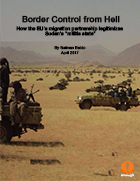
Click here to read the full report in English.
الملخص التنفیذي | Résumé analytique | Zusammenfassung
Large-scale migration to Europe has precipitated a paradigm shift in relations between the European Union (EU) and the government of Sudan, and closer ties between both entities. This new partnership has resulted in the EU disbursing millions of euros to the Sudanese government for technical equipment and training efforts geared toward stopping the flow to Europe of migrants from Sudan and those from Eritrea, Ethiopia, Somalia, and other countries in sub-Saharan Africa who come through Sudan.
The EU’s action plan will involve building the capacities of Sudan’s security and law enforcement agencies, including a paramilitary group known as the Rapid Support Forces (RSF), which has been branded as Sudan’s primary “border force.” The EU will assist the RSF and other relevant agencies with the construction of two camps with detention facilities for migrants. The EU will also equip these Sudanese border forces with cameras, scanners, and electronic servers for registering refugees.
There are legitimate concerns with these plans. Much of the EU-funded training and equipment is dual-use. The equipment that enables identification and registration of migrants will also reinforce the surveillance capabilities of a Sudanese government that has violently suppressed Sudanese citizens for the past 28 years.
Sudan’s strategy for stopping migrant flows on behalf of Europe involves a ruthless crackdown by the RSF on migrants within Sudan. Dogged by persistent armed uprisings led by opponents protesting chronic inequalities in the distribution of national wealth and political power in its periphery regions, the Sudanese government has always relied on a plethora of militia groups to counter insurgencies. The RSF is one of these militia groups. It evolved from the disparate Janjaweed militias that carried out the genocidal counterinsurgency policy of the Sudanese regime in Darfur that began in 2003. However, in its functions and evolution, the RSF differs significantly from other militia groups employed by the government.
The RSF first evolved from a strike force deployed against insurgents in Darfur into a national counterinsurgency force under the operational command of Sudan’s National Intelligence and Security Services (NISS) that was tasked with fighting the Sudan People’s Liberation Movement/Army-North (SPLM/A-N) in South Kordofan and Blue Nile states. Then, in September 2013, the RSF was deployed against peaceful demonstrators who were protesting the Sudanese government’s removal of subsidies on basic commodities. More than 170 people were killed in September 2013, in incidents that unmasked the Sudanese regime’s dependence on the militia to quell political dissent and marked a new evolution in the role of the RSF.
Starting in 2015 and 2016, and convinced of the RSF’s effectiveness as a counterinsurgency force, the regime designated the RSF as Sudan’s primary force tasked with patrolling Sudanese borders to interdict migrants’ movement. The Sudanese government made this designation within the framework of its partnership with the EU for the control of migration. As such, the RSF is positioned to receive EU funds for reducing the flows of migrants from Sudan to Europe. The Sudanese government enacted a law in January 2017 that integrated the RSF into the Sudan Armed Forces (SAF, national army). The 2017 law (conflictingly) made the RSF autonomous, integrated into the army, and under the command of President Omar al-Bashir (see below).
The EU and the EU member states that are most engaged with Sudan in the actual programmatic partnership on migration flows should scrutinize the record and conduct of the RSF as the partnership unfolds. By “building the capacity” of Sudan’s newly minted border force with funding and training, the EU would not only be strengthening the hand of the RSF but also could find itself underwriting a complex system of a “militia state” that Sudan has evolved into since the current regime came to power in 1989. In so doing, the EU contradicts and undermines the overriding objectives of its own founding treaty. EU members cannot advance peace, security, and human rights and they cannot stem irregular migration from Sudan and the Horn of Africa by directly funding a government that deploys a militia group that stokes violent conflict, commits atrocities, and creates massive displacement of populations within Sudan.
The remainder of this paper synthesizes public information about the RSF’s activities and argues how EU support for this group could ultimately worsen irregular migration to Europe, escalate violent conflict within Sudan and the Horn of Africa, and embolden a regime and militia force that acts with impunity and now faces even fewer checks on its criminal behavior. This paper aims to highlight the latest developments from Sudan and examine the record of earlier engagements of the RSF, lest one or all of Sudan’s EU partners claim, at a later date, that they were unaware of the perverse incentives at play.

